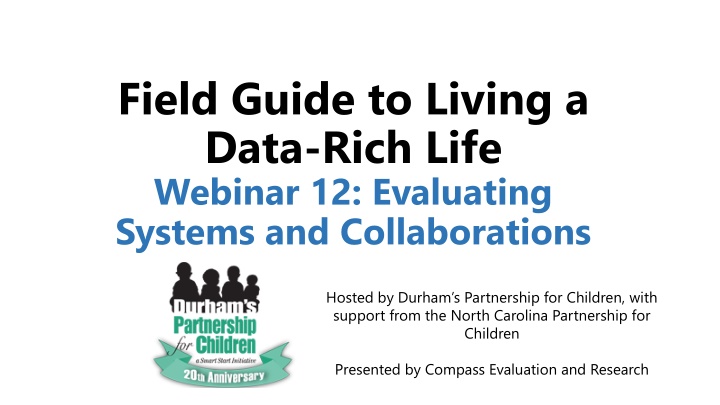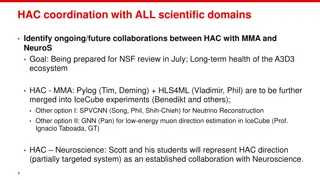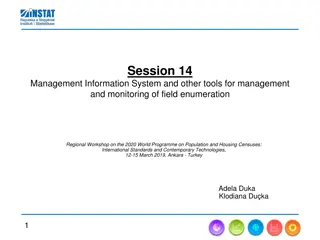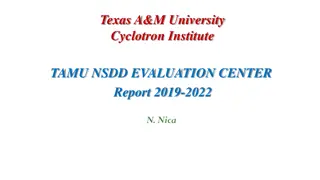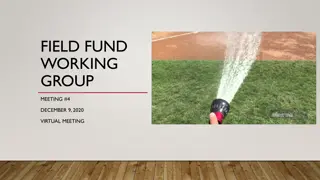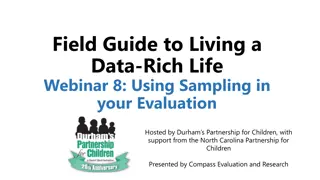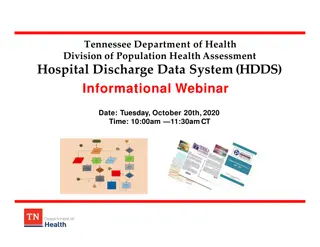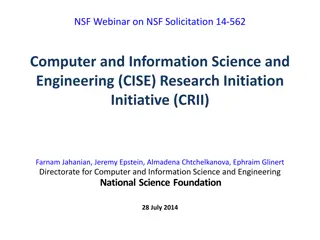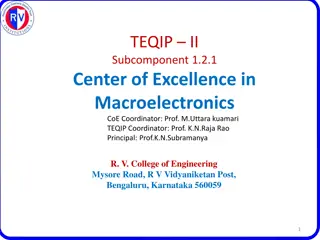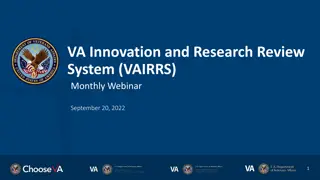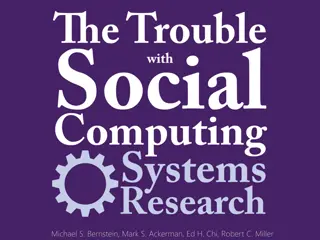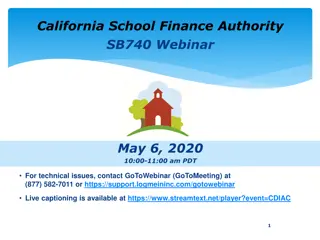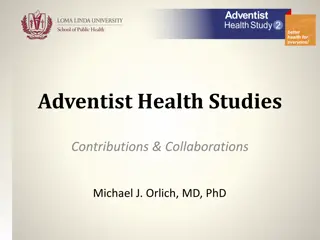Field Guide to Living a Data-Rich Life Webinar on Evaluating Systems and Collaborations
This webinar, hosted by Durham's Partnership for Children with support from the North Carolina Partnership for Children, delves into evaluating systems and collaborations. Explore the concept of systems, components, and processes, along with frameworks like the BUILD model and Bronfenbrenner's Ecological Model. Learn how a Theory of Change and Logic Model can aid in evaluation, and discover the importance of collective impact in data-rich living.
Download Presentation

Please find below an Image/Link to download the presentation.
The content on the website is provided AS IS for your information and personal use only. It may not be sold, licensed, or shared on other websites without obtaining consent from the author.If you encounter any issues during the download, it is possible that the publisher has removed the file from their server.
You are allowed to download the files provided on this website for personal or commercial use, subject to the condition that they are used lawfully. All files are the property of their respective owners.
The content on the website is provided AS IS for your information and personal use only. It may not be sold, licensed, or shared on other websites without obtaining consent from the author.
E N D
Presentation Transcript
Field Guide to Living a Data-Rich Life Webinar 12: Evaluating Systems and Collaborations Hosted by Durham s Partnership for Children, with support from the North Carolina Partnership for Children Presented by Compass Evaluation and Research
Overview Field Guide to Living a Data-Rich Life Compass Evaluation and Research What do we mean by systems and collaborations? Planning out an evaluation Mixed methods approaches Evaluating Systems and Collaborations
What is a System? Field Guide to Living a Data-Rich Life Compass Evaluation and Research Ecologically: a community and its natural environment Many inter-dependent organisms and niches Social: actors able to produce actions and outcomes, specific to environments Many inter-dependent actors and needs Early Childhood: resources and services designed to strengthen and support the social, physical, and learning needs of young children Many inter-dependent actors, resources, and services Evaluating Systems and Collaborations
System Frameworks Field Guide to Living a Data-Rich Life Compass Evaluation and Research Presents systems concepts What are the important components and processes? Can form foundation of a Theory of Change and Logic Model Can be helpful for developing and implementing an evaluation Evaluating Systems and Collaborations
Field Guide to Living a Data-Rich Life Sample System Framework: BUILD model Compass Evaluation and Research Evaluating Systems and Collaborations
Field Guide to Living a Data-Rich Life Compass Evaluation and Research Sample System Framework: Bronfenbrenner s Ecological Model Evaluating Systems and Collaborations
Field Guide to Living a Data-Rich Life Sample System Framework: Collective Impact Compass Evaluation and Research Evaluating Systems and Collaborations
Evaluating Systems.1 Identify the systems needs Resources Type of resources Primary: people and direct services Secondary: transportation, translation support Scope of resources Are resources sufficient to the need? Policy Rules, laws, and guidance Processes Who receives what from whom? What is the flow of resources and interactions? Awareness Supply Demand Sensitivity Field Guide to Living a Data-Rich Life Compass Evaluation and Research Ask: do we need a different type of program or do we have the programs we need, just not enough of them? Ask: do our clients want to <<insert the type of change or action you would like to see>> and if so, do they have access to change agents or services? Evaluating Systems and Collaborations
Evaluating Systems.2 Field Guide to Living a Data-Rich Life Compass Evaluation and Research What will it take to build the system? People Do you need a champion? Investment Awareness and Information How long will it take to build? What factors can help or hinder progress? Public and political approval Evaluating Systems and Collaborations
Evaluating Systems.3 Field Guide to Living a Data-Rich Life Compass Evaluation and Research Construct your theory of how the systems work will proceed Who will be involved? How often? What is step 1, step 2, step 3 ? What kind of short-term, intermediate, and long-term changes can be expected? Example: Coffman Framework for Evaluating Systems Evaluating Systems and Collaborations
Coffman Framework for Evaluating Systems Initiatives Field Guide to Living a Data-Rich Life Compass Evaluation and Research Evaluating Systems and Collaborations
Evaluating Systems.4 Field Guide to Living a Data-Rich Life Compass Evaluation and Research Collect your data Developmental Progress and theory of change is uncertain Formative Inform systems progress as it occurs Summative Identify whether or not systems change actually is occurring Evaluating Systems and Collaborations
Evaluating Systems.5 Developmental approach Focus on relationships and innovation Exploring, Creating, Emerging Field Guide to Living a Data-Rich Life Compass Evaluation and Research Evaluating Systems and Collaborations
What is the role of collaboration? Field Guide to Living a Data-Rich Life Compass Evaluation and Research Is collaboration the goal or the strategy? Goal: collaboration is the system element that is missing Establishing collaboration is the outcome Strategy: collaboration is the means for producing a desired outcome; the desired outcome reflects the system element that is missing Evaluating Systems and Collaborations
Example 1: Collaboration as the goal Field Guide to Living a Data-Rich Life Compass Evaluation and Research Two or more agencies are charged with collaborating to develop a county-level resource bank for distributing information, resources, and services Collaboration is the short-term outcome that is necessary for producing the resource bank Evaluating Systems and Collaborations
Example 2: Collaboration as the strategy Field Guide to Living a Data-Rich Life Compass Evaluation and Research Two or more agencies want to improve access to preventive health services across the county and in doing so, increase the proportion of children receiving preventive care and screenings Collaboration is the strategy agencies use to reduce duplication of services and neighborhoods served Also can be considered a very short-term outcome Evaluating Systems and Collaborations
Evaluating Collaboration Field Guide to Living a Data-Rich Life Compass Evaluation and Research Model 1: Nature of collaboration Networks, coalitions, partnerships, co-funders, collective impact Model 2: Collaboration process Himmelman s Partnership Quotient Model 3: Nature of collaborative relationships Wilder Collaboration Factors Inventory Evaluating Systems and Collaborations
Evaluating Collaboration.2 Field Guide to Living a Data-Rich Life Compass Evaluation and Research What are the collaboration needs? Is it a goal or a strategy? What model or models of collaboration are in play? What is the theory of change? Who will be involved? How often? What is step 1, step 2, step 3 ? What kind of short-term, intermediate, and long-term changes can be expected? Is there a formal process or plan to develop or maintain collaboration? Evaluating Systems and Collaborations
Evaluating Collaboration.3 Field Guide to Living a Data-Rich Life Compass Evaluation and Research Collect your data Developmental approach What does collaboration look like? What should it look like? Is it happening yet? Why or why not? Who should be involved? Formative approach Is collaboration proceeding as planned? How can we improve our approach to ensure we achieve collaboration? How can we provide helpful feedback to staff? Summative approach To what extent is collaboration occurring? What does collaboration produce? Evaluating Systems and Collaborations
Evaluating Systems and Collaborations Field Guide to Living a Data-Rich Life Compass Evaluation and Research Evaluating Systems and Collaborations
Evaluating Systems and Collaborations Field Guide to Living a Data-Rich Life Compass Evaluation and Research Mixed methods approaches Numbers and stories will be important What numbers tell you that systems are improving? That collaboration is progressing? What stories inform the how and why of systems and collaboration work? Evaluating Systems and Collaborations
Evaluating Systems and Collaborations Field Guide to Living a Data-Rich Life Compass Evaluation and Research Evaluating Systems and Collaborations
Evaluating Systems and Collaborations Field Guide to Living a Data-Rich Life Compass Evaluation and Research Spend time planning: Sequential or concurrent design Concurrent when limited timeframe for data collection If sequential: qualitative or quantitative first? Results from one can inform the other Evaluating Systems and Collaborations
Questions? Field Guide to Living a Data-Rich Life Compass Evaluation and Research Evaluating Systems and Collaborations
Additional questions? Taylor Webber-Fields Durham s Partnership for Children Phone: 919-403-6960 Email: taylor@dpfc.net Field Guide to Living a Data-Rich Life Compass Evaluation and Research Evaluating Systems and Collaborations
Additional questions? Feel free to contact me, too! Sarah Heinemeier Compass Evaluation and Research Phone: 919-308-5019 Email: sarahhei@compasseval.com Field Guide to Living a Data-Rich Life Compass Evaluation and Research Evaluating Systems and Collaborations
